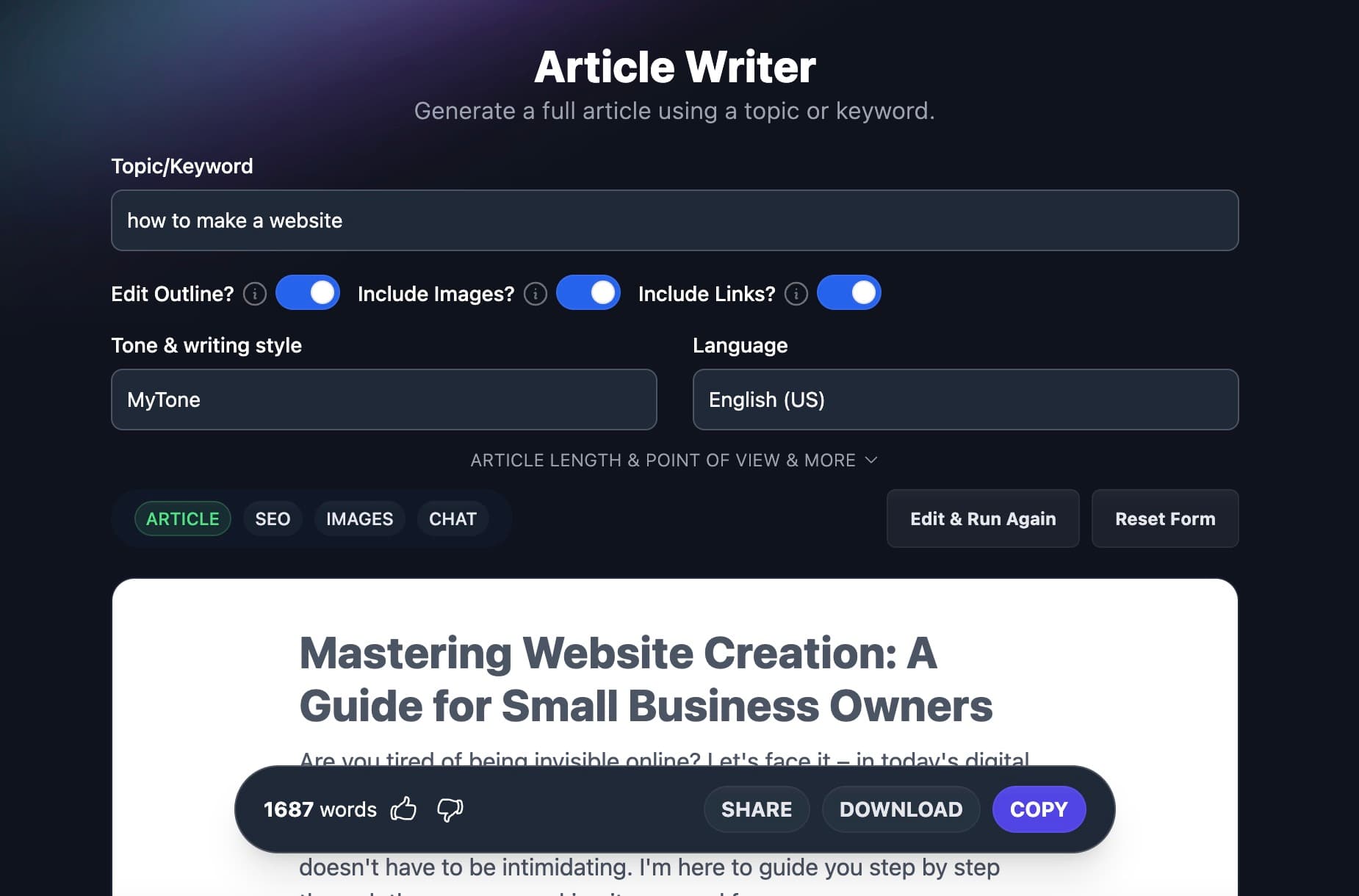AI Tools for Marketing Agencies (+5 Ways to Do More with Less)

One of the top questions we’ve seen buzzing around marketing forums and across our social media feeds lately is: “What are the top AI tools for marketing agencies, and how do we actually benefit from using AI in our field?” It’s no surprise why this question pops up so frequently—marketing is changing a lot.
Apart from the need for constant creative execution, agility and adaptation are also essential traits for any marketing agency that wants to thrive in a future where AI is clearly here to stay.

The ever-changing landscape of customer preferences, market dynamics, and technological advancements demands quick implementation. That’s where AI comes in as especially handy—speeding up your processes significantly.
It’s no wonder that a whopping 81% of marketers acknowledge the positive impact of AI on their work. If you’re considering integrating AI into your marketing agency’s workflow, you’ve come to the right place.
In this guide, we’ll share the best AI tools tailored towards marketing agencies and explore how AI can help you do more with less. Let’s get into it.
The Rise of AI Use Inside Marketing Agencies
At first glance, there seems to be some division within the marketing community regarding the adoption of generative AI. However, upon closer examination, it becomes pretty dang clear that most marketing agencies are embracing AI integration into their workflows—even if it’s somewhat reluctantly.
For example, back in 2022, before the introduction of ChatGPT, Ryan Law, then CMO at Animalz, expressed his enthusiasm for AI, stating:
“We’re already pretty comfortable with the idea of AI writing advertising material, website copy, product descriptions, and even social media content. But AI can (and will) be used for bigger, more complex parts of content marketing — particularly SEO.”
Another marketing agency that’s begun recently advocating for AI adoption is Flying Cat Marketing. They shared their perspective on integrating AI into marketing strategies, saying: “Initially, there was uncertainty surrounding AI. Then, a wholehearted embrace of it. And now? A balanced discernment about its use.”
Although I consider Flying Cat Marketing among the laggards in generative AI, this statement points to a wider adoption of AI tools for content marketing agencies.
Similarly, Simon Collister, a research and strategy consultant, has said, “From my experience at Unlimited, we’re finding that the day-to-day reality of AI in marketing is very much gravitating towards using it to ‘do less to achieve more’.”
Clearly, if you choose to adopt AI, you’ll be in good company. BUT… you’ll need to do this thoughtfully, tactfully, and in ways that amplify your own strengths as a marketing agency.
Our point of view at RightBlogger is simple: AI is your partner and assistant, not your competitor. Marketers who adopt AI will be able to do more and have a competitive advantage over those who do not. And the data supports this, as the latest Sprout Social Index Report found. Now, let’s make this real.
5 Practical Use Cases of AI Tools for Marketing Agencies
While the effectiveness of generative AI is widely acknowledged, its applications vary depending on the user. For marketing agencies, here are the five most impactful use cases we’ve seen:
1. Copy & Content Writing
This is the most straightforward and widely embraced use of generative AI. It’s also one of the most popular use cases for marketing agencies that use RightBlogger, particularly with our supercharged Article Writer:

Tasks falling under this umbrella include brainstorming ideas, crafting outlines, generating meta descriptions, composing social media posts, writing blog posts, creating listicles, generating ads, and even proofreading.
Although generative AI proves handy for these tasks, we always recommend that users remain actively involved throughout the entire process. This advice holds particularly true for marketing agencies, which have reputations to uphold.
When using AI to generate long-form articles, pay special attention. AI-generated content may inadvertently contain errors or instances of plagiarism, posing potential risks to your credibility and authenticity.
I like what Victor Ijidola, a content marketer and co-founder of Leaps, said about this:
“My best tip to scale content creation (without sacrificing quality) is to use it to flesh out already established POVs. The general idea of scaling content with AI often comes with the assumption that you can just insert a topic and some context into an AI tool and get a high-quality content piece in return. But at this point, we’ve all used AI long enough to know that’s not true.”
Ijidola added that “the better way is to determine your POV on a topic, create your outline (AI can also do this if given enough context), start writing, and let AI complete your sentences as you go.”
Relying solely on AI to produce a large volume of articles cannot only harm your SEO but also tarnish the reputation of your marketing agency. Therefore, it’s essential to incorporate a significant human element at every stage of the process.
A helpful tool to facilitate this is RightBlogger, our AI writing assistant. RightBlogger’s article writer includes a feature that allows you to incorporate your perspective from the outset, ensuring a more personalized and authentic touch to your content.

Here are some tips to make the most of generative AI for your copywriting:
- Nail the prompt: The clearer and more precise your instructions, the better the results. While tools like ChatGPT and Gemini (formerly Bard) may need specific prompts, it’s always crucial to have a good grasp of how to interact with any AI tool effectively.
- Fact-check and avoid plagiarism: Take the time to verify every claim AI makes and be vigilant for any signs of plagiarism. If the AI cites a source, make sure to cross-check it for accuracy and credibility.
- Inject your perspective: Don’t forget to infuse your unique point of view into the content. After all, it’s what your audience is after.
- Polish for a human touch: Despite the advancements in AI, it still can’t quite match the finesse of human writing. So, don’t hesitate to let human editors refine the content for better flow and that essential human touch.
2. SEO & Content Optimization
AI offers a multitude of benefits for SEO, with one of its strongest applications being in this field. Apart from generating SEO-focused outlines and articles, generative AI tools like RightBlogger can also assist in:
- Keyword research
- Topic clustering
- Backlink checking
- Content optimization
- Content gap analysis
While many are familiar with the functionalities of keyword research and backlink analysis, the potential of AI in topic clustering, content optimization, and content gap analysis is still underutilized.
Let’s take topic clustering, for instance. Building topical authority in your niche is crucial for ranking well on Google. Topic authority encompasses various signals that Google considers when assessing a website’s expertise in a specific subject, ultimately influencing its ranking.
When a team of HubSpotters tested this approach, they discovered that grouping articles led to improved placement in the SERPs. However, article grouping isn’t just a random choice—it’s a strategic decision.
With the help of AI, you can complete this process a lot faster.
Here’s an example of a keyword cluster developed by RightBlogger, which saved me hours of research and brainstorming.

Another crucial use case is content gap analysis, which is typically a time-consuming and mentally draining task. A generative AI tool can do this for you in minutes while uncovering insights you might have missed otherwise.
I recently attempted a content gap analysis with RightBlogger, and I was amazed by the recommendations it provided.

Here are some tools that can assist you with this:
- RightBlogger: for keyword research, developing topic clusters, and conducting content gap analyses.
- Surfer SEO: for optimizing content.
3. Email Personalization at Scale
Campaign Monitor reports that personalized email messages can increase click-through rates by an average of 14% and boost conversions by 10%.
However, many automated email campaigns lack personalization, leading marketers to manually craft their outreach emails.
But now, thanks to AI, we have email tools that can expedite this process. These tools can create targeted lists, craft personalized emails, and automate sending based on schedules.
By leveraging extensive datasets from various channels, they can segment your audience effectively and tailor emails to each group.
Here are some email tools that can help you:
- Lemlist: for building verified email lists, scaling personalization, and automating email management.
- RightBlogger: for crafting personalized emails, optimizing subject lines, and editing content.
4. Content Creation Workflow Automation
A polished content creation workflow smooths out every step, from brainstorming to hitting the publish button.
In a content strategy setup, a series of tasks are necessary to successfully produce different content formats like blog posts, social media posts, or ad copy.
Here are some ways you can add AI to your workflow as a marketing agency:
- Internal collaboration: AI-powered project management tools streamline internal collaboration by automating task assignments, progress tracking, and real-time project updates. These tools facilitate seamless communication, task prioritization, and on-time project completion, ensuring smooth operations within your agency. Tools for this include ClickUp and Nifty.
- Performance reporting: Monitoring your website’s SEO performance is crucial for successful campaigns. Utilize tools like Surfer SEO to continuously track SEO metrics and generate regular performance reports. These insights provide valuable information on the effectiveness of your SEO strategies, facilitate easy tracking of progress over time, and simplify reporting on campaign success.
5. Ideation & Brainstorming
AI tools can rapidly generate multiple variations of concepts within seconds, allowing you to brainstorm and test new ideas at a conceptual stage.
This accelerates the ideation process and provides a wealth of creative options to explore.
That way, you can push boundaries, test limits, and chart new territories of creativity. And with each variation generated, you’re inching closer to that breakthrough idea that will set your project apart.
I find RightBlogger’s ideation tool extremely useful for this.
5 Best AI Tools for Marketing Agencies
Generative AI tools vary in their capabilities, with some tailored for specific tasks while others excel in different areas. While there are AI tools designed for bloggers and AI for content agencies, our focus here is on AI tools specifically crafted for marketing agencies.
Having explored various applications of AI for marketing agencies, let’s highlight our top recommendations for AI tools for marketing agencies:
1. RightBlogger

RightBlogger stands out as a comprehensive AI platform designed specifically for marketers, bloggers, and freelance writers. With an extensive array of over 60 tools spanning diverse categories such as SEO, blogging, sales, productivity, and social media, it offers a robust toolkit for content creation and optimization.
Here are some of the features of RightBlogger and how they can empower your marketing agency:
- Article Writer: Using RightBlogger’s article writing tool, you input essential details like the article title, point of view, tone, target audience, and more. Based on this information, it generates an outline for your article, which you can then customize before proceeding to draft your content. Entering those pieces of information allows RightBlogger to adapt to your style and standards.
- Keyword Research: Beyond merely presenting search volumes, RightBlogger’s keyword research feature provides insights into related keywords and competition levels. This functionality enables you to strategically prioritize articles tailored to your verticals, optimizing your content strategy.
- Content Gap Analysis: Whether your goal is to enhance the ranking of an existing article or identify information gaps to elevate your content above competitors on search engine results pages (SERPs), RightBlogger’s content gap analysis feature equips you with comprehensive insights to achieve these objectives.
- Interview Questions: Incorporating expert interviews into your content? RightBlogger offers recommendations on pertinent questions to ask, enhancing the quality and depth of your interviews.
- Keyword Clustering: You can simplify your client’s content planning process and bolster their authority in specific areas by using RightBlogger’s keyword clustering feature. By identifying strategic keyword clusters, you can quickly build a content calendar, optimizing content delivery and saving valuable time.
- YouTube Video to Blog Post: Whether you want to repurpose your YouTube video into a blog post or simply transcribe it to form the basis of your article, this feature gets you covered.
Pricing: RightBlogger offers unlimited usage for $29.99 per month.
2. Anyword

Anyword is an AI writing assistant tailored specifically for ad agencies and copywriters. If you’re in search of a generative AI tool specializing in crafting concise copy aimed at driving conversions—think ads, product descriptions, and social media posts—Anyword is your go-to solution.
Equipped with a preset keyword library, Anyword allows you to include or exclude relevant keywords in your content. This includes keywords pertinent to product announcements, new arrivals, new features, and more.
Anyword also sets itself apart with its predictive performance analytics feature. This feature evaluates your content’s potential resonance with your target audience and provides insights to optimize your copywriting strategy.
Pricing: Anyword’s pricing plans start at $39 per month.
3. ChatGPT

ChatGPT is the most advanced of the conversational AI tools. It allows users to engage in natural language conversations. As the most advanced generative AI tool available, its capabilities extend beyond mere conversation—it can also execute specific tasks based on user instructions.
While it proves valuable during the research phase, as outlined in (insert article reference), its effectiveness hinges on the quality of your prompts.
However, its general-purpose nature renders it less useful for marketers compared to AI writing tools like RightBlogger, which are specifically designed for specific tasks such as marketing.
Pricing: ChatGPT Plus will run you $20 per month.
4. Describely

Formerly Copysmith, Describe writes SEO-optimized product descriptions. If you own an eCommerce storefront and want to generate product descriptions in bulk, Describely can help.
Pricing: Describely starts at $38 per month.
5. Jasper

Jasper AI can boost your content team’s productivity and results. With a handy collection of around 50 writing templates, it’s not just for marketing folks.
Even academics and students can tap into its power to craft top-notch papers, essays, and presentations. So whether you’re working on a marketing campaign or acing your next research project, Jasper AI can be of help.
Pricing: Jasper’s plans start at about $69 per month.
Getting the Most of the Best AI Tools for Marketing Agencies
The best AI tools for marketing agencies encompass a range of functionalities tailored to optimize various aspects of digital marketing. Here’s our shortlist of top AI tools for agencies:
- RightBlogger: Offering a comprehensive suite of over 60 tools spanning SEO, blogging, sales, productivity, and social media, RightBlogger empowers marketing agencies to create and optimize content with ease.
- Anyword: Specifically designed for ad agencies and copywriters, Anyword excels in crafting concise, conversion-focused copy for ads, product descriptions, and social media posts, augmented by predictive performance analytics.
- ChatGPT: As a versatile conversational AI tool, ChatGPT facilitates natural language conversations and task execution, aiding research and content ideation processes.
- Describely (formerly Copysmith): Specializing in SEO-optimized product descriptions, Describely streamlines content creation for eCommerce storefronts, ensuring engaging and relevant product descriptions at scale.
- Jasper AI: With around 50 writing templates, Jasper AI boosts content team productivity, catering not only to marketing but also academic needs, making it a versatile asset for agencies and students alike.
So who takes the win? We’re more than a little biased, but RightBlogger, of course 😉 You can try out RightBlogger now for free.
What are the best AI tools for marketing agencies, and what is each one best at?
The best AI tools for marketing agencies help you create content faster, improve SEO, and scale campaigns without adding headcount.
RightBlogger is an all-in-one toolkit for marketers, with tools for writing, SEO research, content planning, and repurposing. It is best when you want one place to manage many tasks.
Anyword is strongest for short, conversion-focused copy like ads, product descriptions, and social posts. It is a good fit for teams that write a lot of paid or promo copy.
ChatGPT is great for research, brainstorming, and drafting when you have clear prompts. Describely is built for bulk, SEO-friendly eCommerce product descriptions. Jasper is a general writing assistant with lots of templates for marketing and beyond.
How can we use AI for copywriting and blog content without hurting quality or SEO?
Use AI to speed up drafts, but keep humans in control of facts, voice, and final edits. This helps you get the time savings without risking thin content or mistakes.
Start with your point of view, key examples, and the main takeaway you want readers to remember. Then let AI build the outline and first draft so your team can spend more time improving the ideas.
A practical workflow is to draft in a tool like the RightBlogger AI Article Writer, then do a human pass for accuracy and clarity. Keep an eye on claims, dates, and any “too perfect” sounding statements.
To keep your brand voice consistent across writers and clients, set a style guide and use tools like RightBlogger MyTone to match tone and wording. This makes AI content feel like it came from your team, not a robot.
How does AI help with SEO tasks like keyword research, topic clusters, and content gap analysis?
AI helps with SEO by turning slow research work into quick, repeatable steps. It can suggest keywords, group topics into clusters, and find what competitors cover that you do not.
Topic clusters matter because they help you build authority around one subject, not just rank one page. AI can speed up the planning so you can publish a connected set of articles faster.
Content gap analysis is another big win. Instead of manually comparing pages, AI can point out missing sections, related questions, and subtopics that can help your page beat the current top results.
After you update content, you can use AI to refine on-page SEO like headings, meta descriptions, and internal links. For an example of this kind of workflow, see how AI can auto optimize SEO content.
Can AI really personalize cold emails at scale without sounding fake?
Yes, AI can personalize cold emails at scale if you feed it the right inputs and keep the message simple. The goal is to sound like a helpful human, not a template.
AI works best when you give it a clear audience, a strong offer, and a few personal details to weave in, like role, industry, or a recent company update. Then you review the output to remove fluff and add real value.
Keep personalization focused on one or two details. Too much “personalization” can feel creepy, and it often lowers replies.
Always test and iterate. Run small batches, measure replies, and refine subject lines and first lines based on what actually gets responses.
How can RightBlogger help an agency do more with less across multiple client blogs?
RightBlogger can help by combining research, writing, optimization, and publishing tools in one workflow. This reduces tool switching and makes it easier to standardize how your agency produces content.
For content production, you can go from idea to outline to draft faster, then polish with your team’s edits. This is especially useful when you manage many client calendars and need consistent output.
For ongoing scale, RightBlogger also supports automation features like scheduling and publishing so fewer tasks are done by hand. If you want a deeper look at streamlining this process, review RightBlogger’s autoblogging workflow.
When you automate, keep clear approvals in place. A simple rule is: AI can draft and prep, but a human should review before anything goes live for a client.
Article by Ali Faagba
Ali Faagba is a B2B SaaS content strategist and writer covering AI, marketing automation, and sales. He tweets at @contentmints.
New:Autoblogging + Scheduling
Automated SEO Blog Posts That Work
Try RightBlogger for free, we know you'll love it.
- Automated Content
- Blog Posts in One Click
- Unlimited Usage





Leave a comment
You must be logged in to comment.
Loading comments...